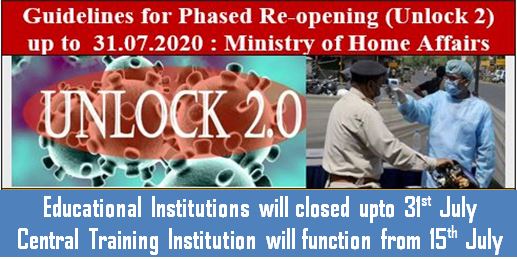Unlock-2: MHA Guidelines for Phased Re-opening upto 31.07.2020. NDMA has directed the undersigned to issue an order to re-open more activities in a calibrated manner, in areas outside the Containment Zones
No. 40-3/2020-DM-I(A)
Government of India
Ministry of Home Affairs
ORDER
North Block, New Delhi-110001
Dated 29 June , 2020
Whereas, an Order of even number dated 30.05.2020 was issued for containment of COVID-19 in the country, for a period upto 30.06.2020;
Now therefore, in exercise of the powers, conferred under Section 10(2)(1) of the Disaster Management Act 2005, the undersigned hereby directs that guidelines on Unlock 2, as annexed, will be in force upto 31.07.2020.
Union Home Secretary
and, Chairman, National Executive Committee (NEC)
To:
1. The Secretaries of Ministries/ Departments of Government of India
2. The Chief Secretaries/Administrators of States/Union Territories (As per list attached)
Copy to:
L All Members of the National Executive Committee
ii. Member Secretary, National Disaster Management Authority
Guidelines for Phased Re-opening (Unlock 2)
1. Activities permitted during Unlock 2 period outside Containment Zones
(i) Schools, colleges, educational and coaching institutions will remain closed till 31 July, 2020. Online/ distance learning shall continue to be permitted and shall be encouraged. Training institutions of the Central and State Governments will be allowed to function from 15 July, 2020, for which Standard Operating Procedure (SOP) will be issued by the Department of Personnel & Training (DoPT).
(ii) International air travel of passengers, except as permitted by MHA.
(iii) Metro Rail.
(iv) Cinema halls, gymnasiums, swimming pools, entertainment parks, theatres, bars, auditoriums, assembly halls and similar places.
(v) Social/ political/ sports/ entertainment/ academic/ cultural/ religious functions and other large congregations.
Dates for re-starting the above activities may be decided separately and necessary SOPs shall be issued for ensuring social distancing and to contain the spread of COVID- 19.
2. Night curfew
Movement of individuals shall remain strictly prohibited between 10.00 pm to 5.00 am throughout the country, except for essential activities, including operation of industrial units in multiple shifts, movement of persons and goods on National and State Highways, loading and unloading of cargo and travel of persons to their destinations after disembarking from buses, trains and airplanes. Local authorities shall issue orders, in the entire area of their jurisdiction, under appropriate provisions of law, such as under Section 144 of CrPC, and ensure strict compliance.
3. National Directives for COVID-19 Management
National Directives for COVID- 19 Management, as specified in Annexure I, shall continue to be followed throughout the country.
4. Lockdown limited to Containment Zones
(i) Lockdown shall continue to remain in force in the Containment Zones till 31 July, 2020 .
(ii) Containment Zones will be demarcated by the District authorities after taking into consideration the guidelines of Ministry of Health & Family Welfare (MoHFW) with the objective of effectively breaking the chain of transmission. These Containment Zones will be notified on the websites by the respective District Collectors and by the States/ UTs and information will be shared with MOHFW.
(iii) In the Containment Zones, only essential activities will be allowed. There shall be strict perimeter control to ensure that there is no movement of people in or out of these zones, except for medical emergencies and for maintaining supply of essential goods and services. In the Containment Zones, there shall be intensive contact tracing, house-to-house surveillance, and other clinical interventions, as required. Guidelines of MoHFW shall be effectively implemented for the above purpose.
(iv) Activities in the Containment Zones shall be monitored strictly by the State/ UT authorities, and the guidelines relating to containment measures in these zones shall be strictly implemented.
(v) States/ UTs may also identify Buffer Zones outside the Containment Zones, where new cases are more likely to occur. Within the buffer zones, restrictions as considered necessary may be put in place by the District authorities .
5. States/ UTs, based on their assessment of the situation, may prohibit certain activities outside the Containment zones, or impose such restrictions as deemed necessary.
However, there shall be no restriction on inter-State and intra-State movement of persons and goods including those for cross land-border trade under Treaties with neighbouring countries. No separate permission/ approval/ e-permit will be required for such movements.
6. Movement of persons with SOPs
Movement by passenger trains and Shramik special trains; domestic passenger air travel; movement of Indian Nationals stranded outside the country and of specified persons to travel abroad; evacuation of foreign nationals; and sign-on and sign-off of Indian seafarers will continue to be regulated as per SOPs issued.
7. Protection of vulnerable persons
Persons above 65 years of age, persons with co-morbidities, pregnant women, and children below the age of 10 years are advised to stay at home, except for essential and health purposes.
8. Use of Aarogya Setu
(i) Aarogya Setu enables early identification of potential risk of infection, and thus acts as a shield for individuals and the community.
(ii) With a view to ensuring safety in offices and work places, employers on best effort basis should ensure that Aarogya Setu is installed by all employees having compatible mobile phones .
(iii) District authorities may advise individuals to install the Aarogya Setu application on compatible mobile phones and regularly update their health status on the app. This will facilitate timely provision of medical attention to those individuals who are at risk.
9. Strict enforcement of the guidelines
(i) State/ UT Governments shall not dilute these guidelines issued under the Disaster Management Act, 2005, in any manner.
(ii) All the District Magistrates shall strictly enforce the above measures.
10. Penal provisions
Any person violating these measures will be liable to be proceeded against as per the provisions of Section 51 to 60 of the Disaster Management Act, 2005, besides legal action under Section188 of the IPC, and other legal provisions as applicable. Extracts of these penal provisions are at Annexure II.
Union Home Secretary
and, Chairman, National Executive Committee
Annexure I
National Directives for COVID-19 Management
1. Face coverings: Wearing of face cover is compulsory in public places; in workplaces; and during transport.
2. Social distancing: Individuals must maintain a minimum distance of 6 feet (2 gaz ki doori) in public places.
Shops will ensure physical distancing among customers.
3. Gatherings:
- Large public gatherings/ congregations continue to remam prohibited.
- Marriage related gatherings : Number of guests not to exceed 50.
- Funeral/ last rites related gatherings : Number of persons not to exceed 20.
4. Spitting in public places will be punishable with fine, as may be prescribed by the State/ UT local authority in accordance with its laws, rules or regulations.
5. Consumption of liquor, paan, gutka, tobacco etc. in public places is prohibited.
‘Additional directives for Work Places
6. Work from home (WtH): As far as possible the practice of WfH should be followed.
7. Staggering of work/ business hours will be followed in offices, work places, shops, markets and industrial & commercial establishments.
8. Screening & hygiene: Provision for thermal scanning, hand wash and sanitizer will be made at all entry and exit points and common areas.
9. Frequent sanitization of entire workplace, common facilities and all points which come into human contact e.g. door handles etc., will be ensured, including between shifts.
10. Social distancing: All persons in charge of work places will ensure adequate distance between workers, adequate gaps between shifts, staggering the lunch breaks of staff, etc.


COMMENTS